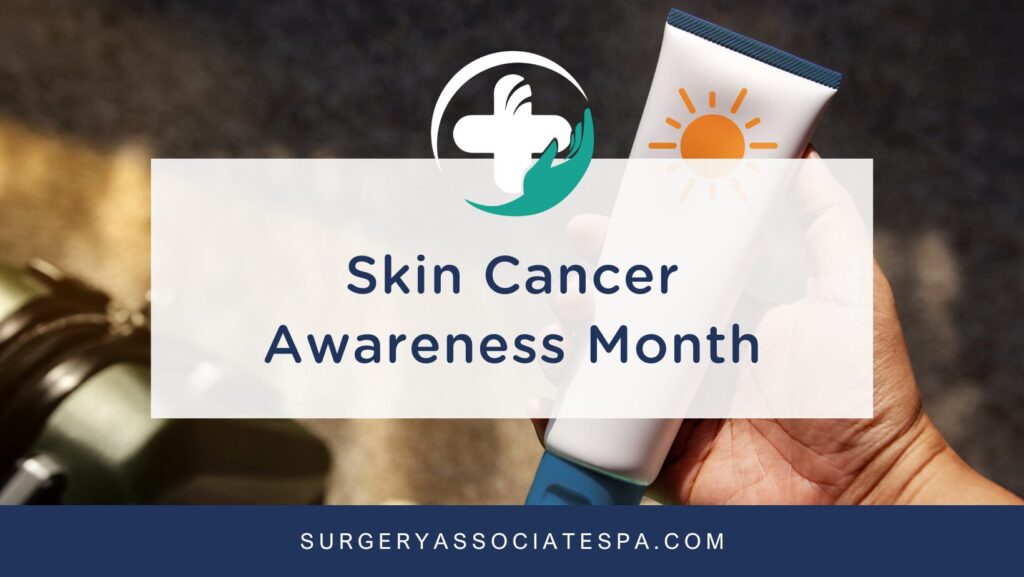
According to the American Association for Cancer Research, more than 5 million Americans are diagnosed each year with nonmelanoma skin cancer. Nonmelanoma skin cancers include basal cell carcinoma and squamous cell carcinoma; these types of skin cancer rarely spread to other parts of the body. Melanoma is a more aggressive kind of skin cancer that is more likely to invade nearby tissue and spread to other parts of the body.
May is Melanoma and Skin Cancer Awareness Month, a time to educate our community on the risks, treatments, and facts associated with skin cancer. Today, we want to cover some of the basics you need to know about melanoma and skin cancer.
Risk Factors
- Anyone can get skin cancer, but according to the Center for Disease Control, certain characteristics–such as a lighter natural complexion; skin that burns, freckles, or reddens easily; certain types and a large number of moles; can put you at a greater risk.
- A personal history of skin cancer or a family history of skin cancer can mean you face a greater risk of developing a skin cancer or melanoma. Knowing your family history is important in dealing with matters of health.
Signs and Symptoms
Each kind of skin cancer prevents unique signs and symptoms. Here is a brief, helpful guide to identifying these symptoms. For more in-depth information, the Mayo Clinic provides a helpful guide.
- Basal Cell Carcinoma occurs on areas of the body that receive higher levels of sun exposure, such as the face or neck. Can appear as a pearly or waxy bump; a flat, flesh-colored or brown, scar-like lesion; or a bleeding or scabbing sore.
- Squamous Cell Carcinoma occurs on sun-exposed areas of your body, but people with darker skin are more likely to develop squamous cell carcinoma on areas less often exposed to sun. This form of skin cancer can present as a firm, red nodule or a flat lesion with a crusted surface.
- Melanoma can develop anywhere on the body. For men and women, and people of any skin tone, melanoma can develop on skin that has not been exposed to sun. Melanoma can present itself in several forms including a mole that changes color or size or a painful lesion that itches or burns.
Preventative Measures
The best way to reduce your risk of developing skin cancer is to practice sun safety. Wearing a broad spectrum sunscreen, staying in the shade, and wearing a wide-brimmed hat that protects your face, head, ears, and neck are all key ways to protect your skin. Most skin cancers are caused by too much exposure to ultraviolet (UV) rays. This also means avoiding tanning beds is a great way to safeguard your health, as these emit harmful levels of UV rays.
Treatment Options
Most early-stage melanomas can be treated with surgery alone, but more advanced skin cancers can require more extensive treatment and sometimes multiple forms of treatment. According to the American Cancer Society, your treatment options for melanoma or skin cancer might include surgery, immunotherapy, targeted therapy drugs, chemotherapy, or radiation therapy. Early detection is key to getting the most optimal treatment plan for skin cancer. If you detect changes in your skin or think you might be at risk, contact your doctor for a consultation.
At Surgery Associates, we understand the stress that comes with finding out you are experiencing a health issue. That’s why we are committed to providing same-day appoints with no referral needed. Call us today at (662) 844-5344 or visit our Patient Resources page to request an appointment. Our office is located at 440 Pegram Drive in Tupelo, Mississippi.











